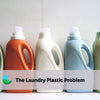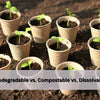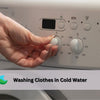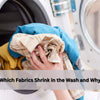From Bottles to Biodegradables: A Cleaner’s Closet Makeover
- by William Polson

If your cleaning closet is filled with traditional cleaning products, perhaps it’s time to replace them with eco friendlier and chemical-free alternatives that come in biodegradable packaging. Conventional cleaners often feature toxic ingredients that can harm the environment.
Luckily, many companies now offer a variety of cleaning products that use natural ingredients and are packaged in biodegradable containers. You can do a complete cleaner’s closet makeover by transitioning from chemical-based products to sustainable cleaning solutions.
The Problem with Plastic
The common problems associated with plastic cleaning products include:
- Environmental impact: Plastic cleaning product containers contribute to the plastic waste problem. This is because most of these plastics end up in landfills, and due to their slow composition, they can pollute water bodies and harm the environment.
Plastic cleaning products that contain microbeads as scrubbing agents can contribute to the release of tiny plastic particles into the environment. These particles can contaminate oceans, be ingested by marine life, and potentially enter the food, causing health risks.
- Chemical Concerns: Many cleaning products packaged in plastic containers usually contain various toxic ingredients, some of which are harmful to human health and the environment. Some of these products contain toxic substances that can cause long-term health complications when exposed to them.
Biodegradable Brilliance: Understanding the Basics
Biodegradable cleaners refer to cleaning solutions that are specifically formulated to degrade naturally over time without impacting the environment. They are generally made from sustainable, plant-based ingredients. Unlike conventional cleaners, natural cleaning solutions do not contain harmful chemicals.
One of the benefits of using biodegradable cleaners is that they are environmentally friendly and sustainable. They break down naturally over time, causing minimal harm to the environment. They are also free from harmful chemicals, reducing the risk of damage to the ecosystem.
Biodegradable cleaning products usually come in packaging made from recyclable materials, reducing the reliance on single-use plastic bottles. This can help reduce waste pollution and the adverse effects associated with the production and disposal of plastic.
Making the Switch: Tips and Tricks
If you’re considering a sustainable switch, here are some tips and tricks to help you transition:
- Assess your current cleaning products and list all the products you want to replace with sustainable alternatives.
- Research reputable brands that offer biodegradable cleaning products.
- When selecting your biodegradable products, read the labels carefully to check for certifications.
- Begin by replacing essential cleaning products such as laundry detergents, soap, and all-purpose cleaners.
- Leverage the green buying guide to ensure you choose the right eco-friendly products.
DIY Green Cleaning Solutions
You may also consider making your own cleaners using natural ingredients, such as essential oils, vinegar, lemon juice, and baking soda. Many resources are available online with DIY natural cleaning recipes for various cleaning needs. These green cleaning items are non-toxic and can be used for most cleaning purposes.
The Future for Cleaning: Sustainable Innovations
The future of cleaning is expected to be more focused on efficiency, sustainability, and innovation. There is an increasing demand for eco-friendly and sustainable cleaning products that are free from toxic chemicals. Hence, building a greener cleaning routine is essential for sustainability, health and safety, and environmental impact.
Conclusion
A cleaner’s closet makeover is essential as it can promote a sustainable lifestyle. If you wish to make an eco-friendly switch, consider adopting biodegradable cleaning products that reduce plastic waste and your ecological footprint.

 Dishwashing
Dishwashing Laundry
Laundry Bundles
Bundles Toilet
Toilet



